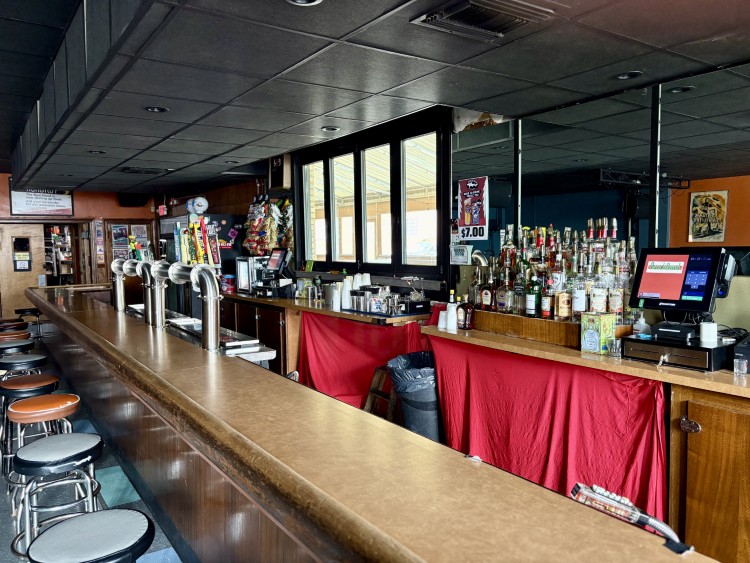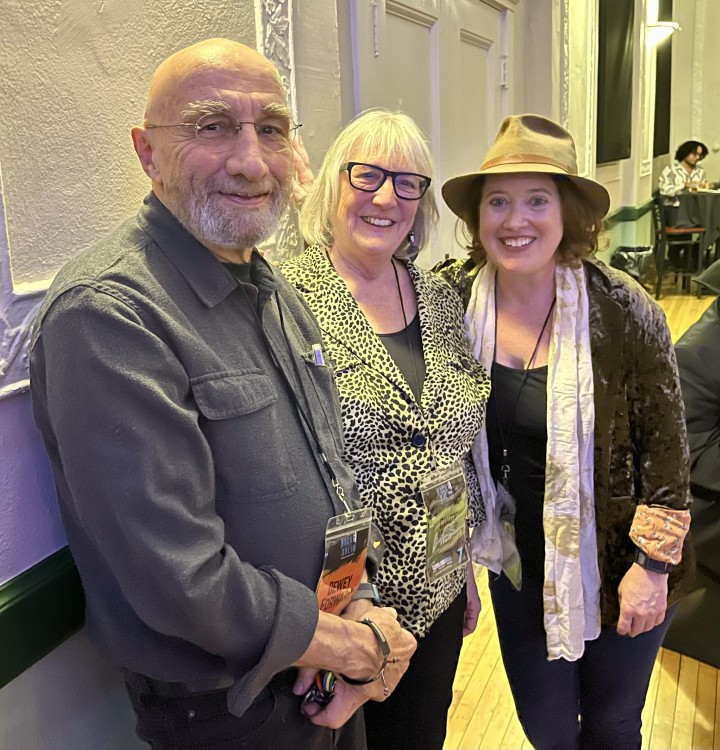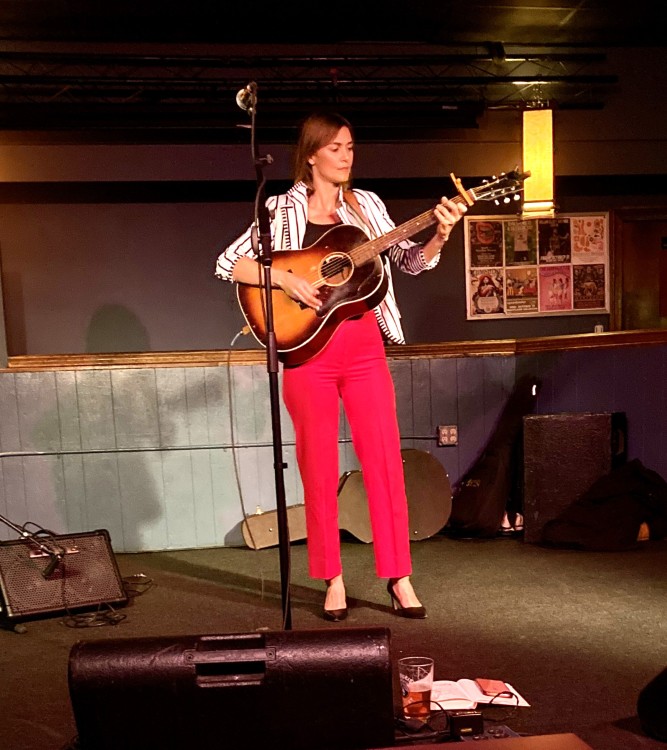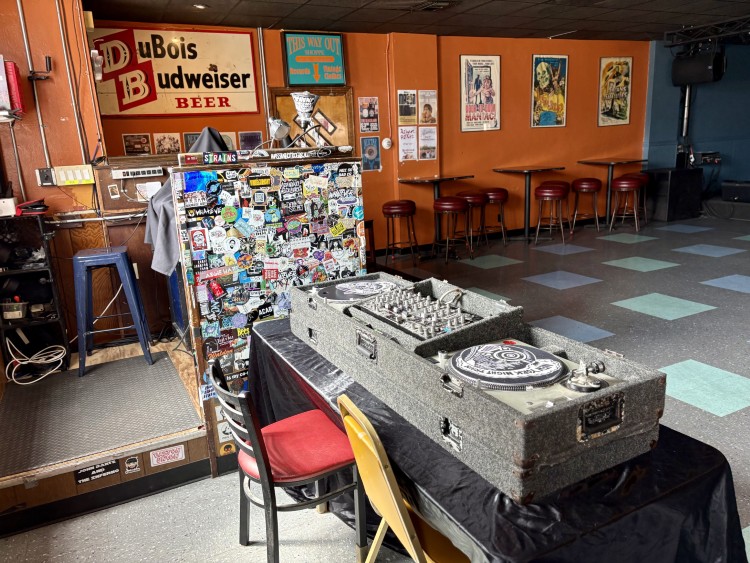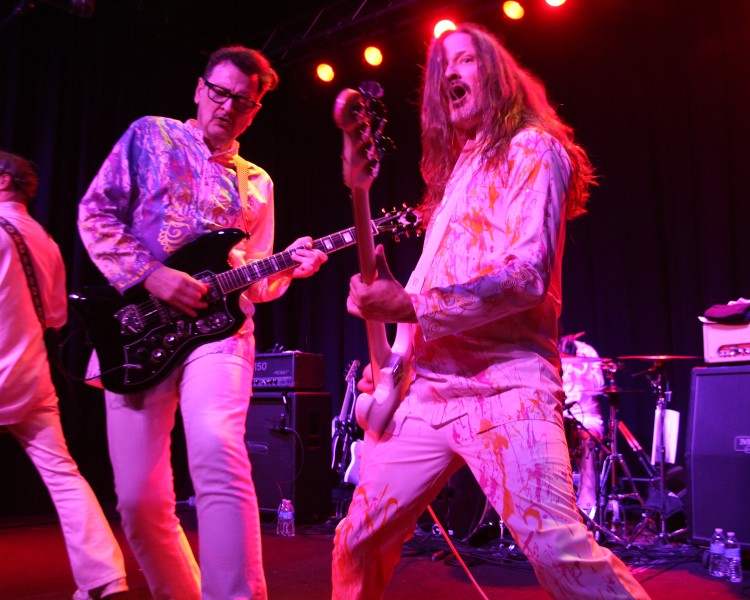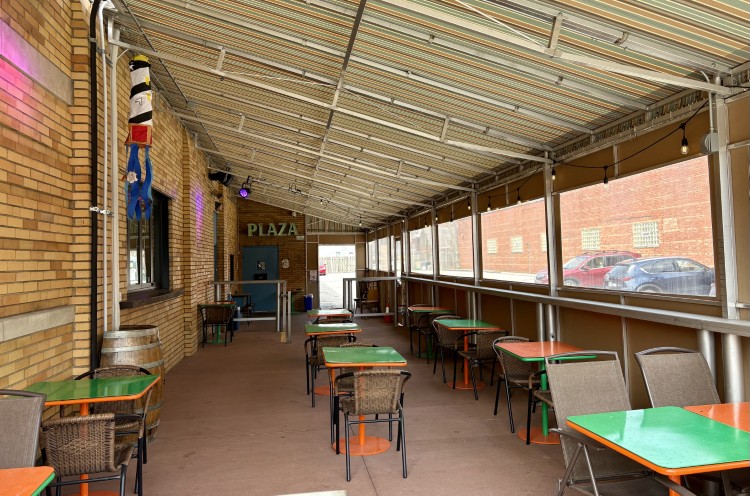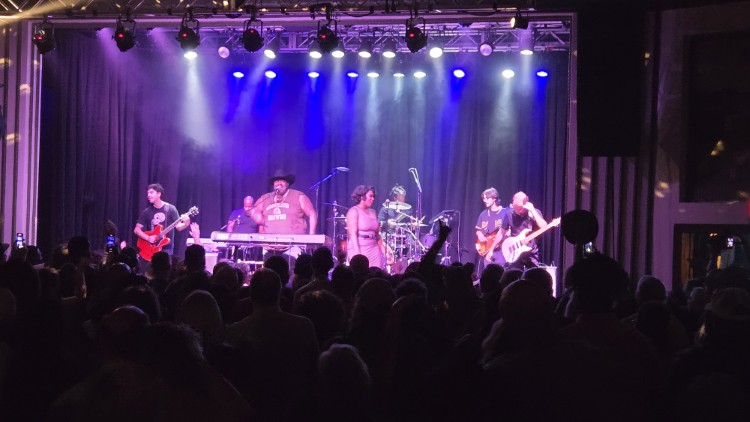Setting the stage: Beachland Ballroom marks 25 years of music, friends, and Collinwood advocacy
This year, the Beachland Ballroom & Tavern complex on Waterloo Road in Collinwood is celebrating 25 years of bringing just about every kind of entertainment imaginable to Northeast Ohio.
From burlesque shows, wrestling, and comedy to music that spans genres from metal, punk, and funk to country, rock ‘n’ roll, Electronica, Americana, and even hours of spinning vinyl records—the Beachland Ballroom Tavern has catered to every musical ear since the doors opened on March 2, 2000.
Adding to these audio and visual pleasures is the way-better-than-bar-food at Sunday Brunches and the lunch, and dinner offerings; beverages poured at the two classic wooden bars; a vintage clothing and novelties store; as well as band merch displayed for purchase when you’re watching all that entertainment.
Bella Sin performing at the 8th Annual International Ohio Burlesque Festival in 2018And we can’t forget the Beachland Flea and other local pop-up events at the Beachland that support the arts, local music, and the business community.
In 25 years, the Beachland has hosted some of the most popular artists in entertainment while acting as the centerpiece of the revitalized Collinwood area known as Waterloo.
Beachland owners and Collinwood ambassadors Cindy Barber and Mark Leddy have been leading the charge for these 25-plus years. And anyone who knows their story offers praise for their patience, perseverance, and the blood, sweat, and tears they have put in—not to mention the large sums of cash invested to keep the Beachland humming.
As a result, the Beachland offers hundreds of shows and events each year to both locals and die-hards who come from as far away as the East and West Coasts to see their favorite performers at this revered, intimate venue.
The beginning
The story began when Barber moved into the Collinwood area in 1986. “A friend of mine, Jim McKnight, a landscape architect, had bought a little house on a cliff overlooking Lake Erie, she recalls. “I was working at an office near him downtown and we became friends. Jim brought me out here to show me his project rehabbing his house.”
During the rehab, Barber had an epiphany.
“[Jim] was right on the lake, and we watched the sun go down and I was like, ‘Oh my God, I want to live here too,’” she says. “I managed to find a rental property close by and I've been here ever since. I just fell in love with this whole neighborhood.”
Barber made good friends early on. “There were a lot of us who lived here,” she says. “People in the music business, like Pere Ubu members were already here, and there were polka dances, ethnic festivals, and a terrific amount of diversity—something that I cherished.
“There was a whole history of the neighborhood with music,” Barber continues. “Some of the players from ‘60s bands like the Outsiders lived here, and local legends Glenn and Gene Schwartz grew up here—there are stories of them drag racing down Lake Shore Boulevard, back in the day. So [there was] some real personality in the neighborhood.”
Barber’s response to the challenges she saw happening in Collinwood neighborhood at that time: Purchase and open the Beachland.
“In the 1990s, there was something called Lakeshore Neighbors, and [the group] had meetings at the church on East 156th Street and were trying to get organized to do good things,” she recalls. “We collectively invested in a building. But the neighborhood started changing really fast, and there was block-busting going on. Real estate people were going door to door and putting letters in mailboxes saying, ‘if you want to sell, we'll help you sell— kind of putting the fear that the neighborhood was changing, and ‘you better get out now.’
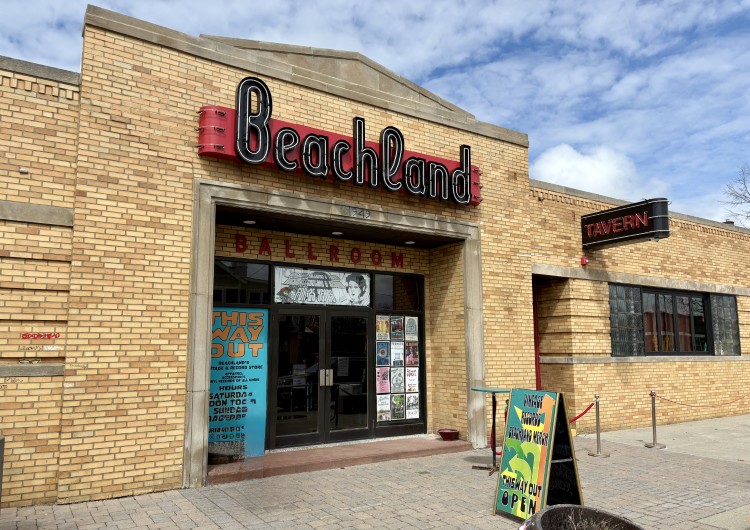 The Beachland Ballroom &: Tavern front entrance“There was just a lot of white flight, a lot of those residents went way east,” Barber continues. “What was starting to happen was the old businesses were just shutting down, there were empty storefronts, and houses were going quickly from owner-occupied to rentals, with owners not really checking on their tenants. Crime was increasing. The East 185th Street festival that had been there for years was shut down because of gang activity.”
The Beachland Ballroom &: Tavern front entrance“There was just a lot of white flight, a lot of those residents went way east,” Barber continues. “What was starting to happen was the old businesses were just shutting down, there were empty storefronts, and houses were going quickly from owner-occupied to rentals, with owners not really checking on their tenants. Crime was increasing. The East 185th Street festival that had been there for years was shut down because of gang activity.”
Barber says she thought she could literally save the neighborhood by purchasing the building that would become the Beachland Ballroom & Tavern.
“I thought by buying this building that the Croatians had owned, we’d create a destination location,” she says. “People would come into the neighborhood and that would help to cut down on the bad elements. We’d build street traffic and activity. And I thought, naively, that if I could take a stand on Waterloo, we would ‘protect’ East 185th Street. It was sort of like a general going, ‘Okay, we're going to take a stand here and we're protecting the village that's over there,’ because East 185th Street was always so stable. I was determined to save my neighborhood. That was really my only thought.”
A spark ignites
With that motivation fueling her, Barber found a partner: Mark Leddy.
“I had known Mark because he was booking Pat's in the Flats, bringing all this great garage rock down from Detroit,” she says. “I felt that he wasn't really making any money at that, and shows were getting overcrowded at Pat’s because he was being so successful. We had a bigger space so I thought we could take all of that and bring it over here.”
And that was when the magic started.
“We became legendary quickly because of Mark’s knowledge,” says Barber. “The White Stripes played here the second or third week we were open. The Greenhornes, which became the Raconteurs and backed Jack White later, were here the first weekend we were open. All those people became early personal friends, so the word spread, and we instantly became one of the places that bands wanted to play.”
Everything else fell in to place.
Rebuilding the building
A structure as old as the Beachland, originally built in 1950, needs a lot of care, and over the course of 25 years, there have been many challenges.
“For years, we had a leaking roof,” recalls Barber. “There was one show a while back when a whole section of plaster from the ceiling fell. Fortunately, no one was injured, but it just happened in the middle of a show. We were constantly putting buckets up in the ceiling and trying to catch these leaks. Our friend, Nick Amster, actually our third partner who came in mid-stream around 2010 or 2011, paid for a new roof and saved us from that.”
In fact, Amster became a critical partner. “He was a big music supporter, originally from Wooster, he lived in the Chelsea Hotel in New York City, befriended The Fugs (the popular New York-based rock band) and knew a lot of music people,” says Barber. “So, he became a partner because he liked what we were doing and saw us struggling. He was also a big patron of Robert Lockwood, a true Cleveland legend.
“We're going to try to continue that legacy in Nick's honor, celebrating Lockwood's 110th birthday this year,” she continues. “Nick passed away in April of 2020 as COVID was starting to happen, and we still miss him.”
The details
Barber says another priority became enhancing the Beachland’s green room, where the performers get ready. “The space is downstairs, but we never had a bathroom for bands,” she explains. “But after COVID, because of the Shuttered Venues [Grants] act, we got funding and were able to install a bathroom with a nice shower.”
Another element has been the concern about neighborhood safety, says Barber, who points out that North Collinwood is statistically one of the lowest crime districts in Cleveland—much like Edgewater or West Park. Barber notes that the neighborhood has been relatively stable over the past several years.
“The bigger challenge is not having a specific and effective Community Development Corporation (CDC) anymore, and I hope that is going to be addressed soon,” she says. “But Northeast Shores Development Corporation, for which I served as board president at one time, had done a lot of work on Waterloo Road and the neighborhood was challenging them to do the same on East 185th Street. The group bought the LaSalle Theatre and were trying to get tax credits and funding.”
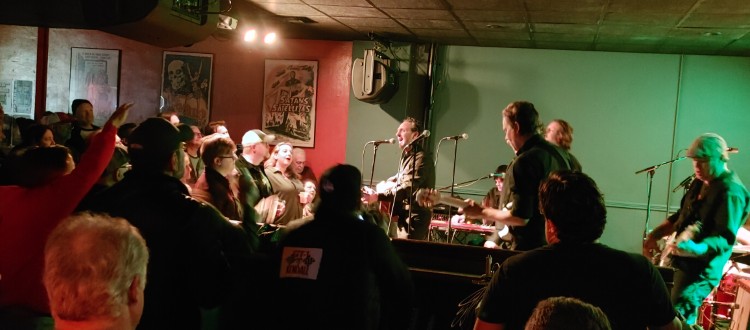 Singer Ike Reilly in the TavernBarber says the CDC shut down years ago because of the debt.
Singer Ike Reilly in the TavernBarber says the CDC shut down years ago because of the debt.
“Our long-time [Ward 8 Cleveland City] councilman, Michael Polensek, is trying to support the neighborhood but without the funding pass-through of a CDC we're really challenged here,” Barber explains. “There are vacant properties that are just sitting here in a kind of a speculative way. Owners are asking too much money for them in the condition that they’re in, which means they aren’t selling in a way that benefits the neighborhood.
“A couple of us put an investment pool together to buy the Slovenian Workmen’s Home down the street as another anchor, which we have turned into the Treelawn Social Hall,” Barber continues. “It’s bigger than the Beachland, with two separate venues there to present music and community events.”
Carrying on the vision
One can’t look back on 25 years without also thinking about the future of the Beachland, and if there’s a plan in place.
“Our succession plan is in the works,” Barber boasts. “We're talking to a few people who want to see this continue. I'm looking at it almost as a kind of a semi co-op, where some employees who really are devoted, who want to keep going, can have some kind of equity share.”
Barber says she sees the equity share plan as paying it forward “I was fortunate to have that situation when I was helping to run ‘The Free Times,’” she recalls. “Richard Siegel, the founder of that publication, gave me an equity share, which, when I left, that buyout helped me do this. So I really want to make that possible.”
Barber says she hopes to get additional outside backing and that long-time patrons will also get involved.
“There are lots of music lovers and concertgoers in town and I'm trying to get more music patronage in town through the nonprofit we started in 2012 to support live music and artists from the area—Cleveland Rocks: Past, Present and Future,” she says. I'm starting to concentrate more on the nonprofit and how we can grow.
She says the nonprofit now owns the building next door to the Beachland and she received state funding to build it out as music hub for musicians to produce videos, recordings, and other content to share their music and create a brand image to build audiences. Additionally, Barber says the Hub received a grant from the Cleveland Foundation to help create programming.
 THe Black KeysBarber says Cleveland Rocks also needs commitment and participation from local artists to create a larger universe, as well as earn the investment of music-lovers and financial supporters.
THe Black KeysBarber says Cleveland Rocks also needs commitment and participation from local artists to create a larger universe, as well as earn the investment of music-lovers and financial supporters.
“We've had the luck of having the Black Keys come out of here, but what happens with some of these other bands that are still struggling to tour,” Barber asks. “Welshly Arms just played here as part of our anniversary, and we helped them get their start.”
Now, Barber is looking to help other local bands get to the next level. How do we get Apostle Jones on the road? How do we get LoConti on the road These are really dynamic, wonderful bands.”
The glory days
The great news for Barber and other promoters and artists is that Cuyahoga County Executive Chris Ronayne is in the process of creating a music and entertainment task force and dedicated to strengthening the region’s music scene, supporting local artists and music venues, and making Northeast Ohio a premier destination for live performances.
Barber, Leddy and their Beachland team continue to closely watch local talent—offering the chance to perform before an audience of 20 or more in the Tavern before they, hopefully, working into the Ballroom, in front of an audience of 500.
“In a way, it’s trying to preserve history while creating new memories and experiences for audiences,” explains Barber. “We had leaders and mentors in the music scene in the 1970s through the early 2000s who helped keep everything on the ‘front page.’”
The Michael Stanley Band at the BeachlandShe names people Steve Popovich and Michael Stanley for the music industry; Plain Dealer writers Jane Scott and Michael Heaton; Akron Beacon Journal writers Bob Dyer and Mark Faris; Mark Holan and the staff at The Cleveland Scene, and other writers who covered music with weekly columns packed with information.
“We also had Dewey Forward, Hank LoConti and others who hosted local acts at clubs, and John Gorman [at WMMS] and other programmers who embraced local acts as part of a very exciting, leading edge radio market,” says Barber, who adds the “whole glory days feeling” is hard to find now.
“We all had smiles on our faces because things were going, they were rocking,” she continues. “The concert business was rocking, the radio business was rocking, the club business was rocking. Then weird stuff happened—like nationwide broadcast entities taking over and they made money-making, and not local businesses and sounds—the driver of what the market heard, saw and read.”
Reflecting on her time in managing all the ups and downs, and the financial, business, booking, and bricks & mortar challenges, Barber leans back and sighs.
“Yeah, it's been rewarding and overwhelming, and the Beachland itself, as an entity, I feel is an amazing success story that I never planned,” she reflects. “Mark [Leddy] has been a part of this experience from the start. We have complimentary skills and complementary interests, I think. I’m the ‘rah-rah, let's keep going, so bigger, better,’ and he's the ‘no, let’s not overspend, let's keep everything very conservative.’
“I think we’ve found middle ground at this point, but it definitely has not been easy,” Barber continues. “This is such a low-profit-margin industry. With any small local performance space, you almost have to have a trust fund to operate any of these venues because it's almost like you're a ‘patron’ of the music.”
Praise from the legends
Many of Cleveland’s leading music industry pros are celebrating the Beachland’s anniversary—recognizing how important the club has been to promoting and producing live music.
- Nationally recognized personal artist manager, author, and long-time Cleveland area broadcaster David Spero reflects on the mark the Beachland had made on the Cleveland music scene in its 25 years.
- Dewey Forward, local entrepreneur and former owner of the famed Peabody’s DownUnder and several other legendary Cleveland clubs, also cherishes the venue and recognizes the 24/7 responsibilities of maintaining the business.
“In my past life as owner of Peabody’s DownUnder and Cafe, I always enjoyed the local musicians the most,” adds Forward. “They molded their crafts and their earnest efforts in their very personal endeavor to succeed. I think there are more open doors due to her efforts at the Beachland, and her advocacy for the local music scene to expand education and mentoring opportunities so local artists can achieve success. As well, she is a real activist for her community, and we all benefit from that energy.
“She wanted my help to start this club and in my first consultation I told her to think very carefully about getting into this business,” continues Forward. “I had been doing it for some 20 years, and turning 50, as was Cindy. I shared with her how hard the business was financially, and how it takes so much physically, with long hours and other trappings of the business. Thank goodness for the Cleveland music scene, she didn’t take my advice and propelled it to greater heights with more opportunities for local musicians than ever before. I gave her some pointers then dropped the consulting contract as I felt guilty for charging an old friend for advice she didn’t really take.”
- Charlie Weiner, a Cleveland-area favorite as a writer and performer, says he, too, believes the Beachland has been of vital importance to the region.
“I guess the thing I love most about Cindy and Mark and Beachland is they are the most giving of people and of clubs,” Weiner continues. “They give back to the community in so many ways. Each time we come up with a need for a benefit for those throughout the country who have suffered from devastating storms, hurricanes or fires, she never says no, just 'let me find a date'. They are the finest of people with hearts the size of pumpkins, you know the prize winning ones, not the ones you get at Halloween!”
Weiner is quick to point out how hard Barber and Leddy work to build up the Collinwood community in addition to promoting the local music scene.
“Finally, and speaking to the future, they have been so out front in providing aid and assistance to musicians and artists in this area through the Cleveland Rocks non-profit and providing a venue of such importance for them to perform at; the value is incalculable,” he says. “There are not enough words or space to express the respect and love I have for Cindy and Mark, their staff, and these clubs.”
The mission continues
After 25 years, and to acknowledge both a job well done and challenges to go, Barber and Leddy— ably assisted by the Beachland Ballroom and Tavern staff—are still working every day to “save” the Waterloo community and the Cleveland-area music scene. That’s important for the neighborhood, for performers, for both locals and visitors who love all forms of entertainment, and for the City of Cleveland.




